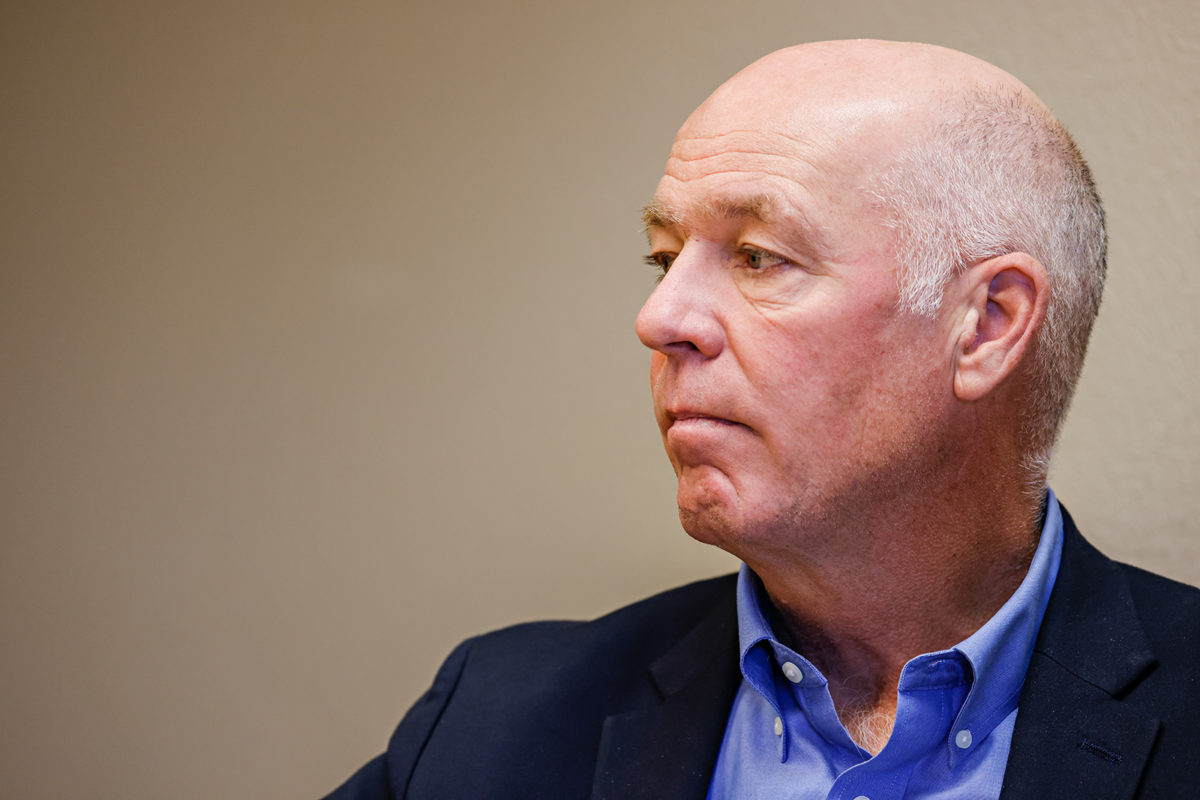As Abortion Restrictions Mount, an Unprecedented Legal Landscape Unfolds
After Republican legislators passed a record number of abortion restrictions this session, Montana’s abortion providers are navigating how to provide continued healthcare while preparing for a legal battle over the judicial precedent that keeps their doors open
By Denali Sagner
Though the 2023 Montana Legislature adjourned sine die last week, closing the book on the state’s lawmaking authority until 2025, for Planned Parenthood of Montana CEO and President Martha Fuller, the fate of the bills passed this session is far from sealed.
Fuller oversees Planned Parenthood clinics in Missoula, Great Falls, Billings and Helena, which — alongside two independent health centers, All Families Healthcare in Whitefish and Blue Mountain Clinic in Missoula — make up the constellation of healthcare providers that perform abortions across Montana. For years, Planned Parenthood, All Families and Blue Mountain Clinic have offered abortion care to pregnant people across the state — care that remains a protected right for Montanans under the 1972 state constitution, per the 1999 Montana Supreme Court ruling Armstrong v. State.
Yet the conclusion of the 68th Montana Legislature illuminated the strength of increasingly conservative political winds that have swept across the state in recent years, crowning the first bicameral Republican supermajority in the Legislature since 1972 and obscuring Montana’s longstanding libertarian and bipartisan past, which was etched five decades ago with the ratification of its unique constitution, one that specifically named privacy as a right of its citizens.
Privacy that, until recently, has been widely understood to guarantee Montanans the right to an abortion.
Efforts by the Montana Legislature to curtail abortion access have grown considerably in recent years, as the once-purple Treasure State has reddened, and the post-Roe v. Wade landscape has opened the door for state legislatures to restrict or ban abortion altogether.
As Republican legislators walk away from Helena this session with a record number of abortion-restrictions on the books, providers are now tasked with offering continued abortion care to pregnant people across the state and region, while fighting to protect Armstrong — a battle that could define the very future of their clinics.

In the 2023 legislative session, Republicans introduced 13 bills attempting to limit abortion access, a substantial uptick from the seven anti-abortion bills brought by legislators in 2021, four in 2019, and two in 2017, 2015 and 2013.
The strength of the Armstrong decision has long warded off Republican efforts to curtail the procedure, as Democratic governors and state courts have blocked anti-abortion laws on the grounds of the right to bodily and procreative autonomy granted to Montanans.
Under Armstrong, “a woman’s moral right and moral responsibility to decide, up to the point of fetal viability, what her pregnancy demands of her” is protected as “procreative autonomy” under the right to individual privacy outlined in the Montana Constitution.
A number of abortion restrictions have been blocked by state courts in recent years, and of the 17 anti-abortion bills introduced from 2013 to 2021, seven passed the Legislature but were vetoed by former Democratic Gov. Steve Bullock.
“Our access to abortion in Montana, as we are all keenly aware now, rests on our Montana constitution, not the Roe decision or the Dobbs decision,” Fuller said.
Yet under a Republican supermajority and Gov. Greg Gianforte — the state’s first Republican and first self-proclaimed “pro-life” governor in 16 years — legislation designed to restrict abortion has met greater success in Helena this session.

Gianforte on May 3 signed five bills into law that would limit abortion in Montana: Senate Bill 154, which clarifies that the right to privacy in the Montana Constitution does not include abortion; House Bill 303, which allows medical providers to withhold services based on “ethical, moral, or religious beliefs;” House Bill 575, a 24-week abortion ban that requires all pregnant people to receive an ultrasound before terminating a pregnancy; House Bill 625, a version of the “born-alive infants measure,” which voters rejected during a November 2022 referendum; and House Bill 786, which would require abortion providers to distribute information about the potential risks of medication abortions and report those disclosures to the state.
“This package of pro-family, pro-child, pro-life bills will make a lasting difference in Montana. We couldn’t have done it alone, and I just want to thank the thousands of Montanans throughout the state who made their voices heard and made today possible,” Gianforte said during the May 3 bill signing.
The governor is expected to sign five more bills that would limit abortion access: House Bill 544, which would institute restrictions on the use of Medicaid to pay for abortions; House Bill 721, a ban on dilation and evacuation (D&E) procedures, which would effectively ban most abortions after 15 weeks; House Bill 862, which would prohibit the use of state funds for abortions; and House Bill 937, which would require abortion providing health centers to be licensed by the state.
Three of the abortion restrictions passed by the Legislature this session were brought by Rep. Amy Regier, R-Kalispell, Sen. Keith Regier, R-Kalispell, and Speaker of the House Rep. Matt Regier, R-Kalispell, solidifying the family’s position as an increasingly powerful conservative bulwark in Helena.
Yet as legislators and lobbyists gathered to join the governor’s celebratory bill signing earlier this month, and Gianforte promised to usher in “one of the next chapters of our pro-life, pro-child, pro-family agenda,” the 10 abortion bills passed out of the 68th Montana Legislature were far from etched in stone.
“If a person were to open up the Montana Code and read our abortion laws, it would not at all accurately reflect what it’s like on the ground,” Fuller said, outlining the discrepancies in laws passed by the Legislature and the reality of abortion access for pregnant individuals in Montana.
While legislators have been able to successfully pass abortion restrictions under a Republican-controlled Legislature and Republican governor, the precedent set by the Armstrong decision has blocked many such laws from going into effect.
The Montana Supreme Court in August upheld a lower court ruling that temporarily blocked three abortion laws passed in 2021 from going into effect while the court system irons out legal challenges. The bills would have banned abortion beyond 20 weeks, eliminated telehealth services for medication abortions and required abortion providers to offer patients the opportunity to listen to a fetal heartbeat or view an ultrasound 24 hours before obtaining an abortion. In the ruling upheld by the Supreme Court, Yellowstone County District Judge Michael Moses blocked the three laws on the basis of Armstrong.
“Pretty much everything else that’s been passed by the Legislature and has gone into effect at this point has been enjoined by the courts,” Fuller said. “The reality on the ground for patients is the same, and that is because we have leaned into our Montana Constitution and gone to the courts to halt enforcement of those unconstitutional laws.”
Already, House Bill 575, the 24-week abortion ban signed by the governor this month, has been temporarily blocked by Lewis and Clark County District Court Judge Mike Menahan over concerns that the legislation “impermissibly infringes on Montanans’ constitutional right to a pre-viability abortion.”
Menahan this month also temporarily blocked a rule issued by the Department of Public Health and Human Services (DPHHS) after Planned Parenthood Federation of America, the Center for Reproductive Rights, and the ACLU of Montana filed a lawsuit against the state on behalf of Montana’s abortion providers. The DPHHS rule would have required that physicians show prior documentation proving that an abortion is “medically necessary” before the state’s Medicaid program can authorize payment for the procedure, erecting a significant barrier for low-income Montanans seeking abortion care. House Bill 544 and House Bill 862, which the governor is expected to sign, would codify similar restrictions into Montana law.

The recent judicial battles highlight the enduring conflict between the state’s right-leaning legislative body and its courts, which, thus far, have remained steadfast in their adherence to the precedent set by Armstrong and the privacy clauses outlined in the 1972 state constitution.
For many Republican lawmakers, however, constitutional challenges to abortion legislation are a key step in their larger goal — the ultimate overturning of Armstrong.
In a hearing on Senate Bill 154, Sen. Keith Regier implored the Senate Judiciary Committee to pass a bill that would clarify that the right to privacy outlined in the Montana Constitution does not apply to abortion, on the grounds that the Constitution guarantees “individual privacy” and that “abortion is not an individual act.”
“A right to privacy should not apply to an abortion any more than a right to privacy applying to child abuse or abusing a spouse,” Regier said.
The senator added, “Courts have made wrong decisions in the past, from Dred Scott to eugenics to Roe v. Wade, the court has made wrong decisions that were later corrected.”
In a Jan. 25 hearing on the same bill on the Senate floor, Sen. John Fuller, R-Kalispell, cited the 14th amendment to the U.S. Constitution, arguing that statewide abortion protections violate the clause that states that no state can “deprive any person of life, liberty, or property, without due process of law” or “deny to any person within its jurisdiction the equal protection of the laws,” outlining constitutional issues that could set up fundamental challenges to the Armstrong ruling.
“Depriving a person of their life without an adjudication process is a violation of the 14th amendment of the United States Constitution,” Sen. Fuller said. “This bill attempts to rectify and commingle the United States Constitution with the Montana Constitution.”
While Planned Parenthood’s Martha Fuller understands the possibility that court battles over abortion restrictions could result in the ultimate reversal of Armstrong, she said she feels “confident that the court understands how the right to privacy works and intersects with the right to an abortion, and that that is strong case law and will continue to be so.”
For providers, however, the increasingly hostile climate around abortion access in Montana has reshaped their work with patients, even though the majority of such restrictions have been blocked by the judicial system.
“We see that the quick nature of policy change at the national level and in the legislature, really leads to confusion and fear a lot of times among our clients,” Aileen Gleizer, a spokesperson for Blue Mountain Clinic and board member of the Susan Wicklund Fund, Montana’s statewide abortion fund, told the Beacon.
Gleizer said that after the reversal of Roe last summer, both the Susan Wicklund Fund and Blue Mountain Clinic were inundated with calls from Montanans who expressed confusion about their abortion options, and fear over criminal prosecution for seeking an abortion.
At All Families, requests for abortions skyrocketed on May 4, the day after the governor’s bill signing on the steps of the Capitol, according to Helen Weems, the founder and director of the clinic.

“We had months where not a day went by where clients didn’t seek to clarify what the status of abortion care was, as well as how secure their appointments were,” Gleizer said. “For a procedure that’s time sensitive, and already in society can often be filled with stigma, the added fear and added uncertainty really impacts people’s ability to access care.”
“That fear is really palpable,” she added.
Abortion providers across the state said that their most important work lies in ensuring that Montanans are aware of their reproductive options in the midst of the legal uncertainty that will only grow as numerous abortion bills are challenged in court.
Currently, All Families provides medication abortion up to 11 weeks of pregnancy and in-clinic abortions up to 12 weeks; Blue Mountain Clinic provides medication abortion up to 11 weeks and in-clinic procedures up 21 weeks; and Planned Parenthood of Montana offers medication abortion up to 11 weeks at all of its clinics, and in-clinic surgical abortion up to 22 weeks at its Helena site.
All of the clinics also mail abortion pills to pregnant people across Montana, an option providers say has been particularly important in increasing abortion access for the state’s many rural communities.
“Especially if we’re talking about rural communities … access is really hard,” Leah Shea, a representative of the Susan Wicklund Fund, said. “Montana has such a unique makeup of a huge percentage of rural communities, and those are close knit communities. With the abortion stigma and access, it’s tough.”

Shea noted that the vast majority of counties in Montana are not home to an abortion provider — including the state’s Native American reservations — forcing pregnant people to travel vast distances and incur significant economic burdens to seek care. According to Shea and Gleizer, the average client seeking assistance from the Susan Wicklund Fund travels 220 miles each way to obtain an abortion in Montana, a burden that can often be avoided through the shipping of pills by mail.
“Using telehealth medication abortion has allowed Montanans living in rural areas the ability to receive evidence-based healthcare from the privacy and comfort of their own home. Many of our patients cannot take time off work, they do not have reliable transportation, or they simply prefer to stay home and have the pills mailed to them,” Nicole Smith, Blue Mountain Clinic’s executive director said in a May 8 statement.
Yet, access to medication abortion has become the latest battleground for legislators and lobbyists, who have sought to restrict its availability. Two of the 10 abortion bills passed by the Montana Legislature impose specific restrictions on obtaining medication abortions. On the national level, All Families Healthcare and Blue Mountain Clinic on May 8 joined independent abortion providers in Virginia and Kansas to sue the U.S. Food and Drug Administration (FDA) to protect access to the abortion pill mifepristone, in the wake of federal legal challenges.
For Martha Fuller and others, fears remain about the consequences of living in a state where abortion is limited or banned altogether. The Planned Parenthood CEO expressed concerns that if abortion becomes restricted, medical providers will flee Montana for states where they are able to practice medicine without fear of prosecution, a phenomenon that has decimated healthcare systems in neighboring Idaho in recent months after the state legislature passed restrictive abortion laws.
“We worry,” Fuller said. “I worry that we’re going to lose providers because they either aren’t able to offer the care that they specialize in and want to offer.”
A hearing is set for May 12 regarding the challenge of the DPHHS Medicaid restrictions on abortion. Legal challenges to the numerous other abortion restrictions passed by the Legislature are expected in the near future.
Until then, Fuller emphasized that her doors, along with the doors of the state’s other abortion providers, remain open.
“Abortion is legal and available in the state of Montana,” Fuller said. “All of the abortion providers in Montana — Blue Mountain Clinic, All Families, Planned Parenthood — we are here to help people navigate that and to understand what their options are and what their choices are, and to make sure that they get the care that’s best for them.”